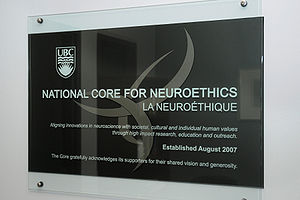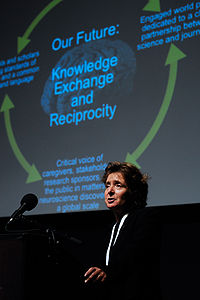
National Core for Neuroethics
Encyclopedia
| National Core for Neuroethics | |
|---|---|
| Name | National Core for Neuroethics |
| Logo | |
| Region | Vancouver |
| Province | British Columbia |
| Country | Canada |
| Coordinates | 49°15′40"N 123°07′28"W |
| Type | Research |
| Speciality | Neuroethics |
| Affiliation | UBC Faculty of Medicine |
| Established | 2007 |
| Website | http://www.neuroethicscanada.ca |
The National Core for Neuroethics at the University of British Columbia
University of British Columbia
The University of British Columbia is a public research university. UBC’s two main campuses are situated in Vancouver and in Kelowna in the Okanagan Valley...
was established in August 2007, with generous support from the Canadian Institutes of Health Research
Canadian Institutes of Health Research
Canadian Institutes of Health Research is the major federal agency responsible for funding health research in Canada. It is the successor to the Medical Research Council of Canada. It aims to create new health knowledge, and to translate that knowledge from the research setting into real world...
, Institute of Mental Health and Addiction, Canada Foundation for Innovation
Canada Foundation for Innovation
Created by the Government of Canada in 1997, the Canada Foundation for Innovation strives to build our nation’s capacity to undertake world-class research and technology development to benefit Canadians...
, the British Columbia Knowledge Development Fund, the Canada Research Chairs program, the UBC Brain Research Centre and the UBC Institute of Mental Health. Led by Dr. Judy Illes
Judy Illes
Judy Illes, Ph.D., is Professor of Neurology and Canada Research Chair in Neuroethics at the University of British Columbia. She is Director of the National Core for Neuroethics at UBC, and faculty in the Brain Research Centre at UBC and at the Vancouver Coastal Health Research Institute...
, the Core has asserted itself on both the national and international stage as a forerunner in the field of neuroethics
Neuroethics
Neuroethics is the ethics of neuroscience, and the neuroscience of ethics.The ethics of neuroscience deals with matters as a subclass of bioethics...
, with particular focus on ethics in neurodegenerative disease and regenerative medicine
Regenerative medicine
Regenerative medicine is the "process of replacing or regenerating human cells, tissues or organs to restore orestablish normal function". This field holds the promise of regenerating damaged tissues and organs in the body by replacing damaged tissue and/or by stimulating the body's own repair...
, international and cross cultural challenges in brain research, neuroimaging
Neuroimaging
Neuroimaging includes the use of various techniques to either directly or indirectly image the structure, function/pharmacology of the brain...
and ethics
Ethics
Ethics, also known as moral philosophy, is a branch of philosophy that addresses questions about morality—that is, concepts such as good and evil, right and wrong, virtue and vice, justice and crime, etc.Major branches of ethics include:...
, the neuroethics of enhancement, and personalized medicine
Personalized medicine
Personalized medicine is a medical model emphasizing in general the customization of healthcare, with all decisions and practices being tailored to individual patients in whatever ways possible...
.
The Core's major research projects are focused on high impact, high visibility areas including the use of drugs and devices for neuroenhancement, ethics in neurodegenerative disease and regenerative medicine research, international and cross-cultural challenges in brain research, neuroimaging in the private sector, and the ethics of personalized medicine, among others. Members of the Core also lead initiatives aside from their research projects.
Considerable attention has been given to the Core by both the scholarly and non-academic media, with the Core featured in the New York Times, the Vancouver Sun, on the Canwest Global Newshour, and in the journal Science
Science
Science is a systematic enterprise that builds and organizes knowledge in the form of testable explanations and predictions about the universe...
, amongst many others. As an effort to engage the public in neuroethics discussion, the Core has recently started an online blog. With the rapid pace of technological advance in the field of neuroscience, the National Core for Neuroethics is poised for continued expansion and success.
Mission
The National Core for Neuroethics strives to tackle the ethical, legal, policy and social implications of frontier neuroscienceNeuroscience
Neuroscience is the scientific study of the nervous system. Traditionally, neuroscience has been seen as a branch of biology. However, it is currently an interdisciplinary science that collaborates with other fields such as chemistry, computer science, engineering, linguistics, mathematics,...
through high impact research, education and outreach to ensure the close alignment of innovation and human values.
Vision

Integrity
Integrity
Integrity is a concept of consistency of actions, values, methods, measures, principles, expectations, and outcomes. In ethics, integrity is regarded as the honesty and truthfulness or accuracy of one's actions...
: Uphold high moral and ethics principles in all aspects of neuroethics research, education and outreach
Innovation
Innovation
Innovation is the creation of better or more effective products, processes, technologies, or ideas that are accepted by markets, governments, and society...
: Pursue creative and novel approaches to long-standing and nascent issues in neuroethics
Leadership
Leadership
Leadership has been described as the “process of social influence in which one person can enlist the aid and support of others in the accomplishment of a common task". Other in-depth definitions of leadership have also emerged.-Theories:...
: Inspire and motivate high impact neuroethics research, education and outreach
Teamwork
Teamwork
Teamwork is action performed by a team towards a common goal. A team consists of more than one person, each of whom typically has different responsibilities....
: Respect the diversity and individuality of thoughts, ideals and beliefs
Partnership
Partnership
A partnership is an arrangement where parties agree to cooperate to advance their mutual interests.Since humans are social beings, partnerships between individuals, businesses, interest-based organizations, schools, governments, and varied combinations thereof, have always been and remain commonplace...
: Actively engage collaborators and stakeholders
Responsiveness
Responsiveness
Responsiveness as a concept of computer science refers to the specific ability of a functional unit to complete assigned tasks within a given time, but also may incorporate the ability of an artificial intelligence system to understand and carry out its tasks in a timely fashion. It is one of the...
: Promote sensitivity to research, education and outreach needs of the external environment
People
The Core is led by Judy IllesJudy Illes
Judy Illes, Ph.D., is Professor of Neurology and Canada Research Chair in Neuroethics at the University of British Columbia. She is Director of the National Core for Neuroethics at UBC, and faculty in the Brain Research Centre at UBC and at the Vancouver Coastal Health Research Institute...
, PhD, Canada Research Chair in Neuroethics and Professor of Neurology at the University of British Columbia.
Peter Reiner, PhD, Professor of Psychiatry at the University of British Columbia, is a Senior Faculty Member with the Core.
Funding

Canadian Institutes of Health Research
Canadian Institutes of Health Research is the major federal agency responsible for funding health research in Canada. It is the successor to the Medical Research Council of Canada. It aims to create new health knowledge, and to translate that knowledge from the research setting into real world...
, Institute of Mental Health and Addiction, Canada Foundation for Innovation
Canada Foundation for Innovation
Created by the Government of Canada in 1997, the Canada Foundation for Innovation strives to build our nation’s capacity to undertake world-class research and technology development to benefit Canadians...
, the British Columbia Knowledge Development Fund, the Canada Research Chairs program, the UBC Brain Research Centre, the UBC Institute of Mental Health, the National Institutes of Health
National Institutes of Health
The National Institutes of Health are an agency of the United States Department of Health and Human Services and are the primary agency of the United States government responsible for biomedical and health-related research. Its science and engineering counterpart is the National Science Foundation...
, the Vancouver Coastal Health
Vancouver Coastal Health
Vancouver Coastal Health is a regional health authority providing direct and contracted health services including primary, secondary, tertiary and quaternary care, home and community care, mental health services, population and preventive health and addictions services in part of Greater Vancouver...
Research Institute, the British Columbia Rural and Remote Health Research Network, the Harvard NeuroDiscovery Center's Foundation for Ethics and Biotechnology, the North Growth Foundation, the Greenwall Foundation, the Stem Cell Network, the Dana Foundation
Dana Foundation
The Dana Foundation is a private philanthropic organization based in New York dedicated to the support of grants and outreach in science, health, and education, particularly in the neurosciences...
, the Canadian Dementia Knowledge Translation Network, and Imperial Oil
Imperial Oil
Imperial Oil Limited is Canada's largest petroleum company. The company is engaged in the exploration, production and sale of crude oil and natural gas. It is controlled by US based ExxonMobil, which owns 69.6% of its stock...
.
Inauguration
In September 2008, the Core celebrated its first anniversary with an inauguration celebration held at the Chan Centre for the Performing ArtsChan Centre for the Performing Arts
The Chan Centre for the Performing Arts is located on the campus of the University of British Columbia near Vancouver, British Columbia, Canada. It is situated within the natural landscape of the campus and is surrounded by evergreens and rhododendrons...
at the University of British Columbia. In attendance were several international dignitaries in the field of neuroethics, including Dr. Joseph Fins
Joseph Fins
Joseph Jack Fins is an American physician and medical ethicist. He is Chief of the Division of Medical Ethics at New York Presbyterian Hospital and Weill Cornell Medical College where he serves as The E. William Davis, Jr., M.D. Professor of Medical Ethics, and Professor of Medicine, Professor of...
(Chief of the Division of Medical Ethics at Weill Cornell Medical College), Dr. Barbara Sahakian (Professor of Clinical Neuropsychology at the Department of Psychiatry, University of Cambridge School of Clinical Medicine), Dr. Eric Racine (Research Unit Director, Institut de recherches cliniques de Montréal), and Dr. Rémi Quirion (Scientific Director, Institute of Neurosciences, Mental Health and Addiction (INMHA)).
External links
Neuroethics Research Centres- National Core for Neuroethics
- Neuroethics Imaging Group, Stanford Center for Biomedical Ethics
- Neuroethics Research Unit
- NovelTechEthics
- Neuroethics.upenn.edu
- The Center for Cognitive Neuroscience, University of Pennsylvania
Neuroethics Blogs
Neuroethics Journals
- Neuroethics
- The American Journal of Bioethics
- The American Society for Bioethics and Humanities
- Virtual Mentor Ethics Journal of the American Medical Association Theme Issue: Ethical Issues in Neuroscience
Neuroethics Societies
Neuroethics Literature Databases
- neuroethics.uni-mainz.de Portal for Neuroethics
- National Core for Neuroethics at the University of British Columbia Publications Page
Neuroethics Resources

